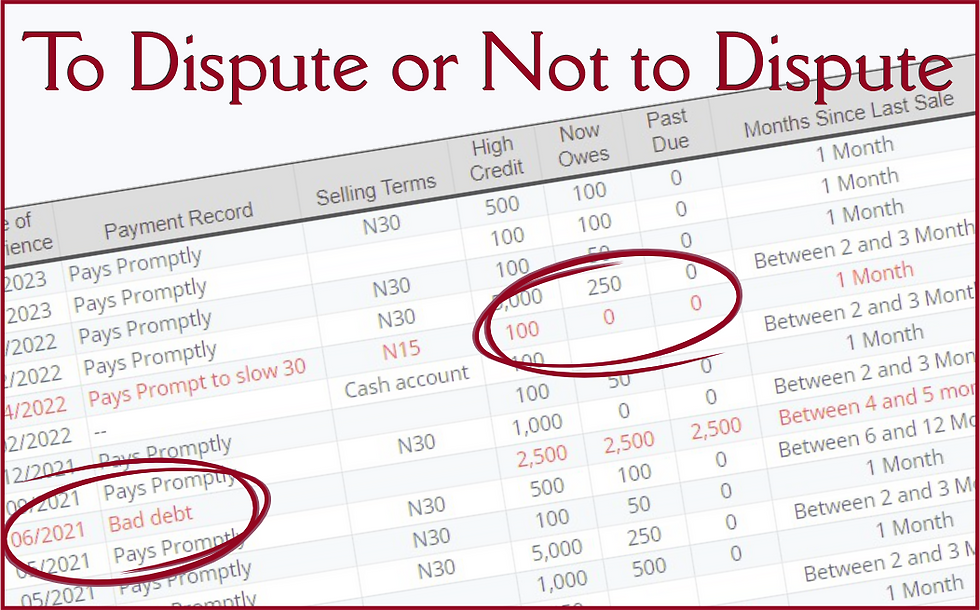THE CREDIT LADDER
- Joy Greenwood
- May 16, 2014
- 4 min read
Updated: Jan 26, 2022
There is more to obtaining business credit than just establishing a DUNS number and filling out applications.
Business credit needs to be built upon verifiable information, expanded using time-tested strategies, and then nurtured with solid payment habits. There are four types of business credit that range from the most basic to the most complex. Knowing the different levels of credit available to small business owners and knowing when to apply is crucial to your financial success.

The most basic credit a business can establish trade or vendor credit, oftentimes called retail credit, and it includes Net term accounts, such as Net 30, Net 10, etc. These credit accounts generally start at lower dollar amounts and are invoiced on Net terms and paid within the defined terms. These accounts are usually easy to get as long as the business has established itself properly prior to the application process, but they are a good preliminary indicator to the business credit bureaus of a company’s credibility and payment habits.
Retail trade lines are typically offered by companies who will sell products needed by your small business. Very rarely do they ask for a personal guaranty, but they will likely pull a business credit report on your company. They will oftentimes report to the business credit bureaus and help you to build a stronger corporate credit profile.
Most small businesses will establish accounts with these types of companies during their early stages, as a part of their normal day-to-day operations, not realizing these companies are reporting their payment habits to the commercial credit bureaus until much later. Remember, a payment paid just a few days past due to these types of retail accounts will weigh heavily on your business credit profile, so it is imperative that they are always paid promptly.
The next level is revolving credit, which offers options for paying down a balance over time or carry debt that is generally higher. These usually require a more in-depth credit check on your company and may even require at least a soft pull on the personal credit to verify identity and potential fraud issues. These accounts are offered business-to-business and may be offered as either set payment terms or open-ended terms. Larger Fortune500 companies who offer revolving store credit cards typically will require a review of the business credit profile for a history of solid payments, good scores and an established commercial credit rating. Some companies will offer contractual credit lines for operational needs, such as equipment financing or the materials needed in day-to-day production.
Credit accounts established for working capital, business credit lines or equipment financing are reserved for companies who have already passed the general muster. Unsecured business lines of credit and major corporate credit cards fall under this category and will require a higher level of creditworthiness that has been pre-established well before the application process. The underwriters, usually banks, are the primary lender at this level and will require not only a business credit check and personal credit check, but may also require financials or bank statements to verify your business income, as well.
Don’t be confused — that does not mean that the credit established will need to be personally guaranteed, especially if these are real estate loans with documentation or small- to moderate-sized loans that will further prove a company’s viability. These loans can be drawn against your company's receivables or bank lines using your inventory or assets as collateral. These larger loans and credit lines may require business owners to provide a well-written business plan, corporate financial statements and some may possibly require a personal guaranty.
Private investors, venture capitalists and other investors are the backbone of the highest level of business credit and financing. This level of credit is generally reserved for larger companies that are well-established and can provide investors with detailed financial statements and projected growth strategies for years into the future. By this time, the business has strong legs underneath it and can stand on its own merit without requiring a personal guarantor, but usually requires there be several upper level managers to oversee business operations and development.
At Starpoint Credit Solutions, our goal is to get the small business owner on a solid path to success, no matter which rung of the ladder you are currently on. Whether you are just starting to build your credit file from scratch or are already making your way to the top, you need to know where you stand and be prepared for the challenges in your path. Sometimes, understanding the factors that impact your business credit can help you generate a strategy in advance or your goals.
A word about Personal Guaranty…
A personal guaranty is a promise made by the business owner or an officer of the corporation to be personally responsible for a loan or business debt in the event of default by the corporation. Personal guarantees allow creditors to protect themselves when lending to small businesses or establishing lines of credit. If a business defaults, the owner or officer is personally liable for the debt and, if need be, the lender can then seize their personal assets. Businesses which have established credit in each of the first three levels and have maintained an excellent Paydex score can usually avoid a personal guaranty.
LESSON: It is easier to achieve credit for your business if you take it one step at a time, attaining each level of credit opportunity before moving on to the next. Trying to leapfrog from level one to level three will often leave business owners disillusioned and frustrated, while working through each level at a steady pace is easier and more productive.




Comments